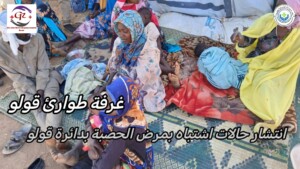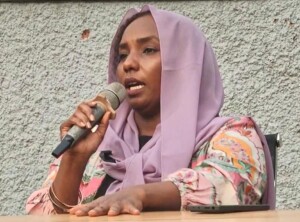Six ‘diarrhoea’ patients die, 97 treated in eastern Sudanese hospitals
Six people died of ‘watery diarrhoea’ in El Gedaref last week. 97 new cases were admitted to hospitals in El Gedaref and Red Sea states. According to Sudan’s vice-president, the health coverage in the country reached 95 percent in 2016.
Schools and markets in El Gedaref have closed their doors to prevent further spread of the deadly disease, of which laboratory tests in Khartoum have revealed that it is cholera.
Speaking to this station on Sunday, medical sources in El Gedaref reported the admission of 40 new patients suffering from ‘acute watery diarrhoea’ last week. Six of them died on Thursday, Friday, and Saturday.
Six people died of ‘watery diarrhoea’ in El Gedaref last week. 97 new cases were admitted to hospitals in El Gedaref and Red Sea states. According to Sudan’s vice-president, the health coverage in the country reached 95 percent in 2016.
Schools and markets in El Gedaref have closed their doors to prevent further spread of the deadly disease, of which laboratory tests in Khartoum have revealed that it is cholera.
Speaking to this station on Sunday, medical sources in El Gedaref reported the admission of 40 new patients suffering from ‘acute watery diarrhoea’ last week. Six of them died on Thursday, Friday, and Saturday.
“In addition, the health clinic in El Gedaref locality received 54 people afflicted with watery diarrhoea between Friday and Sunday,” a doctor said. “The threat to the health situation in the region is more than serious.”
The hospital of Jebeit in Red Sea state received three new diarrhoea cases on Sunday. “No patients died during the past two days,” a medic reported. He called on the health authorities in the region “to break their silence and intervene to save the lives of the people”.
Cholera
In an interview with Radio Dabanga on Friday, Dr Mohamed Naji El Asam, Member of the Doctors Executive Committee, criticised the Sudanese Ministry of Health for keeping silent. “Instead of acknowledging the disease and taking measures to prevent the spread of cholera during the past six months, the authorities opted for not announcing the test results.”
Reports about the spread of ‘watery diarrhoea’ in various parts of Sudan increased during the last quarter of 2016. At least 17 people died of the disease in Blue Nile state in September.
The Health Ministry reported cases in Blue Nile and Kassala in southern and eastern Sudan and River Nile state in northern Sudan in the same month. The first samples of patients were examined for cholera as well.
Since then the deadly disease spread to other localities in eastern and central Sudan.
Universal Health Coverage
Sudan’s Second Vice-President, Hasabo Mohamed Abdelrahman, has renewed the government’s commitment to realise “social justice, sustainable development, and health services for all citizens”, the pro-government Sudan Vision Daily news site reported early this morning.
Addressing the participants of the Universal Health Coverage conference under the theme “Enhancing the transformation of the health sector by advocating for a comprehensive government and society approach”, in Khartoum’s Friendship Hall on Saturday, the vice-president expressed his appreciation of “the efforts of UN organizations towards Sudan, especially the World Health Organization (WHO), the World Bank, and the Global Fund”.
He said that the Sudan’s health coverage increased from 86 percent in 2012 to 95 percent in 2016. Nevertheless, he directed the state governors to activate “health councils” as well.
Federal Health Minister Bahr Idris Abu Garda stated that the conference intends “to bring together key stakeholders and partners to build a common and deep understanding of the health sector reform policies in order to achieve a comprehensive health coverage in Sudan”.
Dr Naema El Gaser, WHO Representative in Sudan, lauded the efforts of the Sudanese Ministry of Health to achieve a comprehensive health coverage in the country.
All UN member states have agreed to try to achieve a universal health coverage by 2030, as part of the UN Sustainable Development Goal 3: Health. This includes financial risk protection, access to quality essential health-care services, and access to safe, effective, quality, and affordable essential medicines and vaccines for all.











 and then
and then